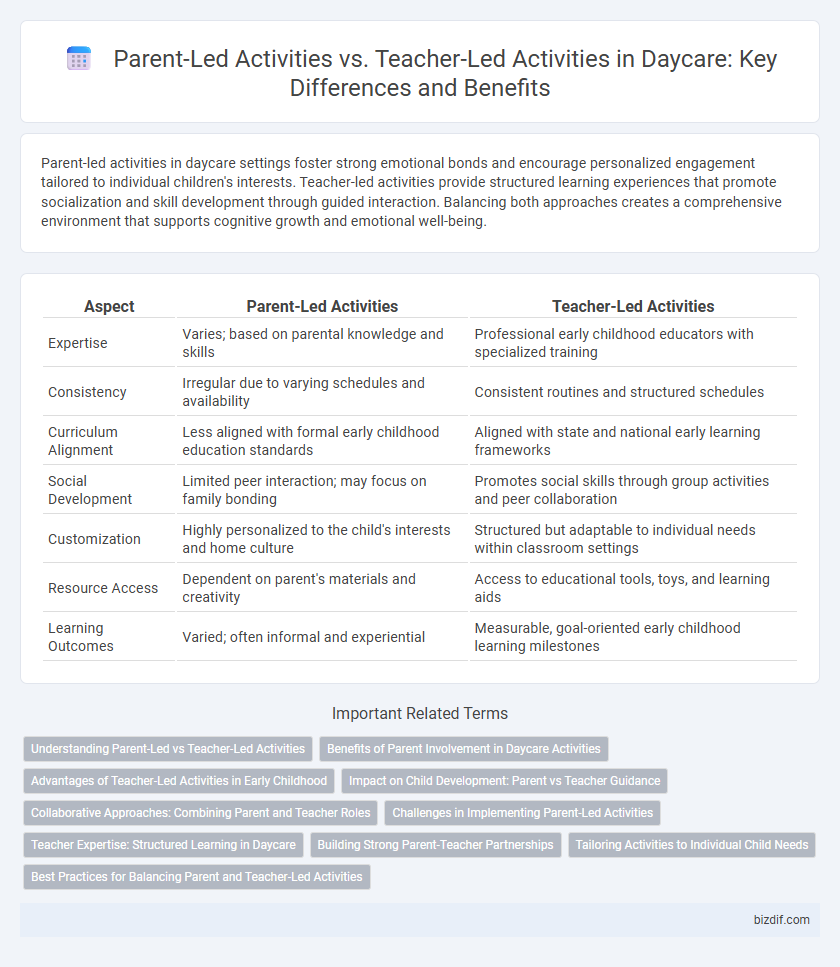Parent-led activities in daycare settings foster strong emotional bonds and encourage personalized engagement tailored to individual children's interests. Teacher-led activities provide structured learning experiences that promote socialization and skill development through guided interaction. Balancing both approaches creates a comprehensive environment that supports cognitive growth and emotional well-being.
Table of Comparison
| Aspect | Parent-Led Activities | Teacher-Led Activities |
|---|---|---|
| Expertise | Varies; based on parental knowledge and skills | Professional early childhood educators with specialized training |
| Consistency | Irregular due to varying schedules and availability | Consistent routines and structured schedules |
| Curriculum Alignment | Less aligned with formal early childhood education standards | Aligned with state and national early learning frameworks |
| Social Development | Limited peer interaction; may focus on family bonding | Promotes social skills through group activities and peer collaboration |
| Customization | Highly personalized to the child's interests and home culture | Structured but adaptable to individual needs within classroom settings |
| Resource Access | Dependent on parent's materials and creativity | Access to educational tools, toys, and learning aids |
| Learning Outcomes | Varied; often informal and experiential | Measurable, goal-oriented early childhood learning milestones |
Understanding Parent-Led vs Teacher-Led Activities
Parent-led activities in daycare environments encourage personalized interaction and foster stronger emotional bonds between children and their caregivers, boosting social development and communication skills. Teacher-led activities provide structured learning experiences designed to meet developmental milestones through guided play, educational tasks, and group collaboration, enhancing cognitive and motor abilities. Understanding the balance between parent-led and teacher-led activities helps optimize early childhood education by combining emotional support with professional instruction.
Benefits of Parent Involvement in Daycare Activities
Parent involvement in daycare activities fosters stronger emotional bonds and enhances a child's social development by creating consistency between home and learning environments. Engaged parents provide individualized support and assurance, boosting children's confidence and participation in group settings. This collaboration between parents and teachers also improves communication, leading to tailored educational experiences that address each child's unique needs.
Advantages of Teacher-Led Activities in Early Childhood
Teacher-led activities in early childhood provide structured learning environments tailored to developmental milestones, enhancing cognitive and social skills more effectively. Qualified educators use evidence-based methods to foster critical thinking and emotional regulation through guided play and targeted instruction. Consistent teacher guidance also ensures individual attention, promoting better mastery of foundational concepts compared to parent-led activities.
Impact on Child Development: Parent vs Teacher Guidance
Parent-led activities in daycare foster emotional bonding and boost a child's sense of security, promoting social and language development through personalized interaction. Teacher-led activities provide structured learning environments that enhance cognitive skills, discipline, and peer collaboration, leveraging professional expertise in child development. Balancing parent and teacher guidance maximizes developmental outcomes by combining emotional support with educational strategies tailored to diverse learning needs.
Collaborative Approaches: Combining Parent and Teacher Roles
Collaborative approaches in daycare merge parent-led activities with teacher-led sessions, enhancing child development by leveraging diverse perspectives and skills. Integrating parental involvement with professional guidance fosters a dynamic learning environment, promoting consistency and enriched experiences for children. This synergy supports social-emotional growth and strengthens parent-teacher partnerships essential for holistic education.
Challenges in Implementing Parent-Led Activities
Implementing parent-led activities in daycare settings often faces challenges such as inconsistent availability of parents due to work schedules and varying levels of comfort or expertise in leading educational tasks. Coordinating and training parents to ensure alignment with the curriculum and developmental goals can require significant time and resources. These obstacles can hinder the seamless integration of parent-led initiatives compared to teacher-led activities, which benefit from professional training and structured planning.
Teacher Expertise: Structured Learning in Daycare
Teacher-led activities in daycare leverage professional expertise to create structured learning environments that support cognitive and social development in young children. Educators utilize evidence-based strategies and age-appropriate curricula to foster critical skills such as language acquisition, problem-solving, and emotional regulation. This structured approach ensures consistent progress and readiness for future academic challenges compared to parent-led activities.
Building Strong Parent-Teacher Partnerships
Parent-led activities encourage family involvement and foster a sense of community within daycare settings, strengthening trust and communication between parents and teachers. Teacher-led activities provide structured learning experiences tailored to developmental milestones, ensuring consistency and educational quality. Combining both approaches enhances collaboration, creating a supportive environment that benefits children's growth and reinforces strong parent-teacher partnerships.
Tailoring Activities to Individual Child Needs
Parent-led activities in daycare settings foster personalized engagement by leveraging intimate knowledge of each child's preferences and routines, enhancing emotional security and developmental support. Teacher-led activities benefit from professional expertise and structured curriculum design, ensuring educational milestones and social skills are targeted effectively. Combining these approaches allows for tailored experiences that address cognitive, emotional, and physical needs, promoting holistic growth in early childhood education.
Best Practices for Balancing Parent and Teacher-Led Activities
Effective daycare programs balance parent-led activities, which foster strong family bonds and cultural continuity, with teacher-led activities designed to promote developmental milestones and social skills. Best practices include scheduling consistent communication between parents and educators to align goals, incorporating flexible activity plans that allow parent participation without disrupting the structured curriculum, and using observation to tailor activities to each child's individual needs. Maintaining this balance enhances child engagement, supports emotional security, and optimizes educational outcomes in early childhood settings.
Parent-led activities vs Teacher-led activities Infographic

 bizdif.com
bizdif.com